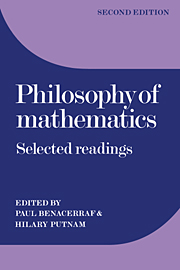Book contents
- Frontmatter
- Contents
- Preface to the second edition
- Introduction
- Part I The foundations of mathematics
- Part II The existence of mathematical objects
- Part III Mathematical truth
- The a priori
- Truth by convention
- Carnap and logical truth
- On the nature of mathematical truth
- On the nature of mathematical reasoning
- Mathematical truth
- Models and reality
- Part IV The concept of set
- Bibliography
Mathematical truth
Published online by Cambridge University Press: 05 June 2012
- Frontmatter
- Contents
- Preface to the second edition
- Introduction
- Part I The foundations of mathematics
- Part II The existence of mathematical objects
- Part III Mathematical truth
- The a priori
- Truth by convention
- Carnap and logical truth
- On the nature of mathematical truth
- On the nature of mathematical reasoning
- Mathematical truth
- Models and reality
- Part IV The concept of set
- Bibliography
Summary
Although this symposium is entitled “Mathematical Truth,” I will also discuss issues which are somewhat broader but which nevertheless have the notion of mathematical truth at their core, which themselves depend on how truth in mathematics is properly explained. The most important of these is mathematical knowledge. It is my contention that two quite distinct kinds of concerns have separately motivated accounts of the nature of mathematical truth: (1) the concern for having a homogeneous semantical theory in which semantics for the propositions of mathematics parallel the semantics for the rest of the language, and (2) the concern that the account of mathematical truth mesh with a reasonable epistemology. It will be my general thesis that almost all accounts of the concept of mathematical truth can be identified with serving one or another of these masters at the expense of the other. Since I believe further that both concerns must be met by any adequate account, I find myself deeply dissatisfied with any package of semantics and epistemology that purports to account for truth and knowledge both within and outside of mathematics. For, as I will suggest, accounts of truth that treat mathematical and nonmathematical discourse in relevantly similar ways do so at the cost of leaving it unintelligible how we can have any mathematical knowledge whatsoever; whereas those which attribute to mathematical propositions the kinds of truth conditions we can clearly know to obtain, do so at the expense of failing to connect these conditions with any analysis of the sentences which shows how the assigned conditions are conditions of their truth.
- Type
- Chapter
- Information
- Philosophy of MathematicsSelected Readings, pp. 403 - 420Publisher: Cambridge University PressPrint publication year: 1984
- 16
- Cited by



